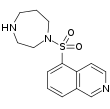Rho kinase inhibitor
Rho kinase inhibitors (rho-associated protein kinase inhibitor or ROCK inhibitor) are a series of compounds that target rho kinase (ROCK). Clinical trials have found that inhibition of the ROCK pathway contributes to the cardiovascular benefits of statin therapy. Furthermore, ROCK inhibitors may have clinical applications for anti-erectile dysfunction, antihypertension, and tumor metastasis inhibition.[1] More recently they have been studied for the treatment of glaucoma.[2]
Examples

Chemical structure of fasudil
- Fasudil, its hydrochloride salt is a drug currently not approved by the U.S. Food and Drug Administration (FDA). In Japan and China it is used for improvement and prevention of cerebral vasospasm and the cerebral ischemic symptoms caused by it after subarachnoid hemorrhage surgery.
- Ripasudil, used in Japan for the treatment of glaucoma and ocular hypertension.
- RKI-1447, a potent small molecule inhibitor of ROCK1 and ROCK2.[3] Studies show that RKI-1447 could have anti-invasive and anti-tumor activities.
- Y-27632, the first small molecule ROCK inhibitor. It selectively inhibits ROCK1 with Ki of 140 nM.[4]
- GSK429286A, C21H16F4N4O2[5]
- Y-30141
References
- ↑ James K. Liao; et al. (Jul 2007). "Rho Kinase (ROCK) Inhibitors". J Cardiovasc Pharmacol. 50 (1): 17–24. doi:10.1097/FJC.0b013e318070d1bd.
- ↑ Wang SK, Chang RT (2014). "An emerging treatment option for glaucoma: Rho kinase inhibitors". Clin Ophthalmol. 8: 883–90. PMC 4025933
 . PMID 24872673. doi:10.2147/OPTH.S41000.
. PMID 24872673. doi:10.2147/OPTH.S41000. - ↑ RKI-1447 is a potent inhibitor of the Rho-associated ROCK kinases with anti-invasive and antitumor activities in breast cancer. 2012
- ↑ "information of different kinds of ROCK inhibitor". selleckchemicals.
- ↑ GSK429286A@pubchem
Further reading
This article is issued from
Wikipedia.
The text is licensed under Creative Commons - Attribution - Sharealike.
Additional terms may apply for the media files.